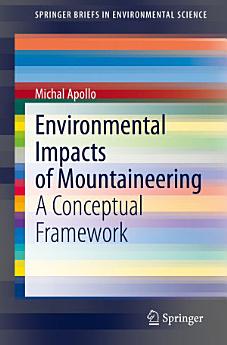Environmental Impacts of Mountaineering: A Conceptual Framework
ພ.ພ. 2021 · Springer Nature
ປຶ້ມອີບຸກ
63
ໜ້າ
reportບໍ່ໄດ້ຢັ້ງຢືນການຈັດອັນດັບ ແລະ ຄຳຕິຊົມ ສຶກສາເພີ່ມເຕີມ
ກ່ຽວກັບປຶ້ມ e-book ນີ້
This book investigates the consequences of mountaineering (hiking, trekking, climbing) on the natural environment. These consequences are divided into three groups: 1) transformations caused by the mountaineer’s, or other people’s, stay in a mountaineering region; 2) transformations caused by the mountaineer’s travel (movement) through a mountaineering region, with the consideration of the ground type (rock, rock and grass, grass, residual soil, snow, ice), and 3) transformations caused by the use of mountaineering equipment. Each of the three groups are examined individually for their direct interference with the environment, i.e. caused by the main activities of climbing, trekking and hiking (both for elite and mass mountaineering) and their indirect interference caused by auxiliary activity (mainly in the case of mass mountaineering). Auxiliary activity includes guide services, transport of equipment, use of base camp facilities and the delivery of artificial support equipment, andsupports the main activity. The consequences of mountaineering on the natural environment are characterized in terms of individual components of the environment (land relief, soil, vegetation, fauna, and landscape) and location/zone of mountaineering activity (hiking, trekking or climbing zone). Because of the connections and interdependence between particular components of the environment (biotic and abiotic), only preservation of each of them can bring the desired effect – a reduction in the negative impact of mountaineering. This book presents comprehensive research outcomes and serves as a platform for more detailed, future studies.
ກ່ຽວກັບຜູ້ຂຽນ
Michal Apollo is an assistant professor at the Institute of Geography, Department of Tourism and Regional Studies at the Pedagogical University of Cracow, Poland. He received his M.Sc. and Ph.D. in earth science in the field of geography at the Pedagogical University of Cracow, and a PGCert in global development from the University of Warsaw, Poland. Michal is an enthusiastic researcher (research field: man-environment systems), traveller (he has visited more than 60 countries on six continents), diver (Open Water Diver), mountaineer (several new climbing routes, including the first ascent on two Himalaya peaks: in 2006, Masala Peak, and in 2012, Forgotten Peak), ultra-runner (100-miler finisher), photographer (a few photo exhibitions), and science populariser (a few hundred pop-science lectures). Michal’s unique background allows him to integrate knowledge from various perspectives into his research and consultancy work. His areas of expertise are tourism management, consumer behaviours, and environmental and socioeconomic issues. In his main research field, he focuses on human presence and well-being in high-mountain regions. Currently, he is working on a concept for the sustainable use of environmental and human resources, as this is the key to the development, prosperity, and well-being of all stakeholders. Michal is a Global Justice Fellow at Yale University, New Haven, USA, and a founder and board member of the Polish Chapter of Academics Stand Against Poverty.
ໃຫ້ຄະແນນ e-book ນີ້
ບອກພວກເຮົາວ່າທ່ານຄິດແນວໃດ.
ອ່ານຂໍ້ມູນຂ່າວສານ
ສະມາດໂຟນ ແລະ ແທັບເລັດ
ຕິດຕັ້ງ ແອັບ Google Play Books ສຳລັບ Android ແລະ iPad/iPhone. ມັນຊິ້ງຂໍ້ມູນໂດຍອັດຕະໂນມັດກັບບັນຊີຂອງທ່ານ ແລະ ອະນຸຍາດໃຫ້ທ່ານອ່ານທາງອອນລາຍ ຫຼື ແບບອອບລາຍໄດ້ ບໍ່ວ່າທ່ານຈະຢູ່ໃສ.
ແລັບທັອບ ແລະ ຄອມພິວເຕີ
ທ່ານສາມາດຟັງປຶ້ມສຽງທີ່ຊື້ໃນ Google Play ໂດຍໃຊ້ໂປຣແກຣມທ່ອງເວັບຂອງຄອມພິວເຕີຂອງທ່ານໄດ້.
eReaders ແລະອຸປະກອນອື່ນໆ
ເພື່ອອ່ານໃນອຸປະກອນ e-ink ເຊັ່ນ: Kobo eReader, ທ່ານຈຳເປັນຕ້ອງດາວໂຫຼດໄຟລ໌ ແລະ ໂອນຍ້າຍມັນໄປໃສ່ອຸປະກອນຂອງທ່ານກ່ອນ. ປະຕິບັດຕາມຄຳແນະນຳລະອຽດຂອງ ສູນຊ່ວຍເຫຼືອ ເພື່ອໂອນຍ້າຍໄຟລ໌ໄໃສ່ eReader ທີ່ຮອງຮັບ.




